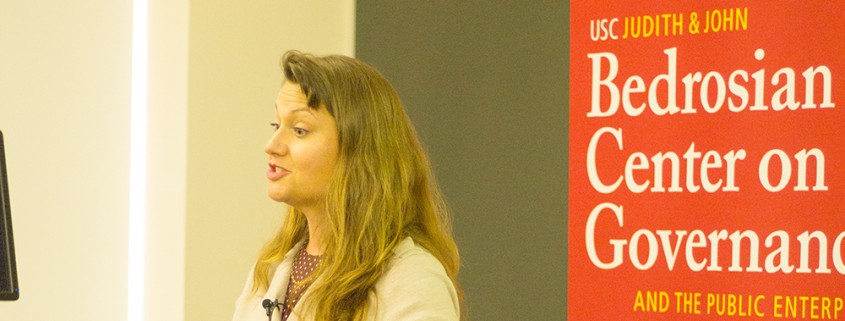Public policy school hosts legislature discussion
The USC Sol Price School of Public Policy hosted Assistant Professor Pamela Clouser McCann on Jan. 11 at Ralph and Goldy Lewis Hall. McCann discussed her latest research regarding negotiations between the House of Representatives and the Senate during the process of passing legislation
McCann, a Ph.D. graduate from the University of Michigan, said that her initial interest in public policy from her prior experience as a genetic counselor. Observing that new healthcare reform laws would impact her patients immensely, McCann decided to pursue further education to understand the process of policymaking.
“When I was seeing my patients, I was often influenced by new legislation,” McCann said. “[This] created a number of difficulties for my patients. When you get trained in genetics, though you get taught certain things about genetic ethics, you don’t get a lot of political science, which is why I went back to school.”
McCann’s research focused on finding a way to accurately understand the House of Representatives and the Senate’s respective contributions to each new piece of legislation. Before a bill becomes law, it must be passed first by the House and the Senate. During this process, according to McCann, many negotiations between the House and the Senate take place due to the politicians’ appeasement of various special interest groups.
In her research, McCann discovered that the bargaining process between the House and the Senate was influenced by each group’s patience as well as the order in which each group passed the law.
“We found that patience comes into play in the effectiveness of your bargaining,” McCann said. “If you are more patient, you would be able to bargain for more, whereas if you are less patient, you would be able to bargain for less. Applying this to the Senate and the House, because Senate members have longer tenures than House members do, Senate members are seen as more patient and in that sense often are able to bargain for more in their law negotiations.”
In terms of order, McCann concluded from her research that, for Senate members, being the first to see the legislation gave it more leverage to bargain. The House of Representatives almost always bargained for less than the Senate could. But, in certain cases, the House could bargain for more than it usually could against the Senate. As a result, the negotiated final enactment would often be largely composed of shared words between the House and Senate bills, with a higher emphasis on the Senate’s intentions.
Beyond the ostensible bargaining, however, McCann presented the idea of tacit bargaining, an idea stating that the act of bargaining in itself is a disadvantage in that by bargaining, one shares information about oneself that may put the competitor at an advantage. Applying tacit bargaining to the House and the Senate, McCann found in her research that sometimes the House of Representatives could bargain for more than it usually could through the act of tacit bargaining and understanding Senate members’ ulterior motives.
Looking at House and Senate contributions to recent laws in Congress, McCann observed a trend that, according to her, may be caused by the recent gridlock in Congress.
McCann recognized that her new findings would allow more in-depth research on the lack of consensus between the House and Senate. According to McCann, one way to better understand the trends in the House of Representatives and Senate negotiations would be to expand her sample of laws from recently passed laws to include unpassed legislation as well. This, according to McCann, would increase understanding of the failings of Congressional negotiations as opposed to simply the successes.
“Over time, House unique contribution varies a bit, but goes way down in recent Congress,” McCann said. “Senate unique contribution also decreases in recent Congress, which is understandable because lately it seems as if Congress has not been able to pass too much. But what was surprising to see was that consensus between House and Senate increased in the recent Congress, whereas negotiations decreased drastically.”

